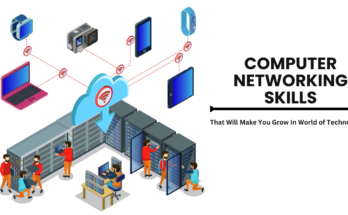What is Network Security Administrator?
Network Security Administrator play an important role in organizational security; they monitor, evaluate, and administer security across computer networks. Network Security Administrator protect data and keep IT systems operational by deploying firewalls and anti-virus software. Network Security Administrator frequently develop and execute effective network security rules and standards across several networks to guarantee that unauthorized users do not get access to company networks.

Network Security Administrator assess the network for operational problems, troubleshoot them, and report the findings. Network Security Administrator are professionals at identifying network operations, security concerns, and security breaches in an organization’s network, as well as extensive knowledge of mitigation and protection tactics.
Key skills of Network Security Administrators
Network Security Administrator need a few critical abilities to keep the network working efficiently and safely. Some skills include:
- Networking skills: They comprehensively understand the networking fundamentals to configure and manage an organization’s network security. They strongly understand different operating systems, networking protocols, and networking services.
- Technical skills: They have strong technical skills to identify and reduce security risks, create security rules and procedures, and perform security audits.
- Security policies and procedures: They understand the organization’s security policies and procedures for providing network security. These security policies refer to well-defined strategies, regulations, and techniques that govern access to an organization’s systems and are implemented throughout the network architecture.
- Communication skills: They have strong written and verbal communication skills. These abilities allow them to successfully collaborate and communicate information to their clients, coworkers, and other IT experts. Effective communication can build trust, which is an important security element.
- Security testing and auditing skills: They are skilled in security testing and auditing tools for network management. Security testing identifies and remediates vulnerabilities and auditing assists in reporting findings and figuring out how to manage internal difficulties.
- Attention to detail: They have an excellent ability to notice small changes in a system that may indicate a security breach.
- Problem-solving skills: Problem-solving capabilities help Network Security Administrators to examine issues and build appropriate security solutions to prevent potential threats. They may also employ problem-solving skills to find vulnerabilities and develop strategies to improve an organization’s network security.
Network administration goals:
- Maintain a robust, high-quality network.
- strategy and increase capacity for seamless access and operations.
- Utilize networking tools for network system administration and improved network management control.
- track and document relevant changes.
- Evaluate potential hazards and plan appropriate mitigation strategies.
- Prevent activities that compromise or use the network for an attack.
- Vector identifies and mitigates attacks to prevent security breaches.

What does a network administrator do?
A network administrator typically manages an organization’s network and is responsible for:
- Install, monitor, debug, and upgrade network infrastructure, including hardware and software components.
- Monitor network activities and optimize for efficiency and usage.
- Manage and provide network access to users and endpoint devices.
In smaller organizations, the responsibilities of a network administrator also include:
- deploying software upgrades quickly utilizing techniques such as Windows Server Update Services (WSUS).
- Planning and conducting regular backups.
- Managing and distributing licenses and ensuring compliance with licensing agreements.
- Installing new software programs and hardware appliances.
There is a vast selection of professional IT software on the market that assists Network Security Administrator with their everyday chores. Remote access and administration solutions enable network administrators to remotely manage machines, making them a popular software. It is an effective tool for network administrators in small businesses since it enables them to give remote support to users, manage user accounts, and monitor network activities.
Network Security Administrator Tools and Software:
| Category | Tool/Software | Description | Benefits | Drawbacks |
|---|---|---|---|---|
| Configuration Management | Ansible, Puppet, Chef | Automate network device configuration and deployments, ensuring consistency and compliance. | Reduces manual errors, improves efficiency, simplifies scaling. | Requires scripting knowledge, potential learning curve. |
| Monitoring & Alerting | Nagios, Zabbix, PRTG | Monitor network performance, health, and availability, with real-time alerting for issues. | Improve network visibility, reduce or minimizes downtime, proactive problem identification. | Can be complex to set up, potential information overload with many alerts. |
| Network Inventory Management | Spiceworks, Lansweeper, Open-AudIT | Discover and track network assets, hardware, software, and configuration changes. | Simplifies audits, troubleshooting aids, asset tracking improves. | May require integration with other tools, potential scalability limitations. |
| Performance Management | SolarWinds Network Performance Monitor, Datadog, Cisco Performance Management Suite | Analyze network performance metrics, identify bottlenecks, and optimize resource utilization. | Enhances user experience, capacity planning aids, network efficiency improves. | Can be expensive, complex for smaller networks. |
| Vulnerability Assessment & Penetration Testing | Nessus, OpenVAS, Kali Linux | Identify and assess network vulnerabilities and security risks through scanning and testing. | Reduce or minimizing attack surface, promotes compliance, improves security postures. | Requires security expertise, potential disruption to network operations. |
| Network Automation | Python, Go, Powershell | Script custom automation tasks for repetitive configuration changes, data collection, and reporting. | Reduces manual workload, increases efficiency, improves consistency. | Requires programming skills, potential security risks with poorly written scripts. |
| Basic Troubleshooting Tools | Ping, Traceroute, Nslookup, Wireshark | Diagnose network connectivity issues, identify packet loss, and analyze traffic flow. | Valuable insight network behavior provided, enables fast troubleshooting. | Limited to specific tasks, requires technical knowledge. |
Employment Outlook for Network & Security Administrators:
Network and security administration professions are in a high-demand around the nation. As technology advances, the need for network security understanding grows. Because of the growing demand, network and security administrator a position is expected to rise by 5% between 2018 and 2028.

Roles and responsibilities of Network Security Administrators
Roles and responsibilities of network security administrators are mention below, which are used to solve the security problems.
- Network security administrators identify the security faults and develop solutions to address them.
- Create, implement, operate, and manage specified network security processes and policies.
- Install and configure network security software and technologies to secure networks from harmful malware.
- Verify, manage, and configure the available IP addresses.
- Implement firewalls, anti-malware, intrusion prevention, vulnerability screening, and other security measures.
- Manage and optimize server use while backing up all vital data.
- Monitor, analyze, and respond to a variety of suspicious security events, including IPS, firewall, IDS, and VPN.
- Monitor network performance to verify that apps execute properly and effectively.
- Collaborate with network administrators and engineers to keep the internet secure.
- Collaborate with people from other teams and departments.
- Strengthens the security system and examines and maintains network security efficiency.
- Keep track of all network users and their allocated rights to guarantee that only authorised individuals may access sensitive data.
conclusion:
In conclusion, network management and security are critical components of modern corporate operations. As firms rely more on networked systems and digital data transfer, effective network management and security policies become critical. Businesses that grasp the foundations of network administration and adopt appropriate security measures may reduce possible risks, protect critical information, and assure continuous operations.



